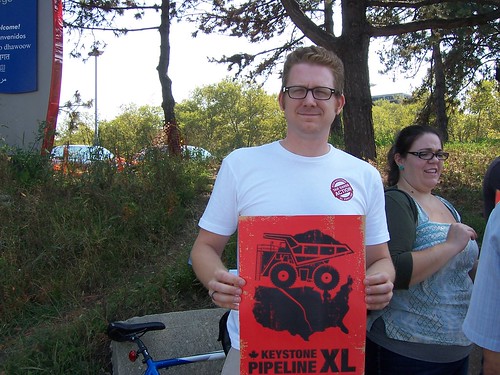Andrew Sidesinger to President Obama: Stop the Keystone XL Pipeline
- Artist: Andrew Sidesinger
- Title: Obama stop the Keystone XL pipeline
- Length: 4:31 minutes (4.13 MB)
- Format: MP3 Stereo 44kHz 128Kbps (CBR)
Andrew Sidesinger and about two dozen other activists were on Cleveland Avenue chanting and holding signs to remind President Obama he has the authority to reject the Keystone XL Pipeline plan.
Sidesinger said tar sands oil extraction violates the rights of indigenous people in Canada, and that it has an enormous amount of green house gas emissions.
"The tar sands is an incredibly dirty project. It destroys a beautiful pristine forest in Canada. It destroys, for every one gallon of gasoline made, 20 gallons of water."
As for why such an environmentally destructive plan is even being considered in the first place, Sidesinger said, "There are a lot of heavily invested oil companies and pipeline companies and people who want to make more money...Everybody drives cars and everybody wants more oil. They want cheap oil."
But this project won't lower oil or gas prices, Sidesinger said.
"Demand is skyrocketing. We need to find ways to reduce our usage, not continue these insane projects. There has to be a limit to what we as a society thinks is reasonable for ways to get our energy. We're scraping the bottom of the barrel, which you saw with BP and the Gulf of Mexico disaster. We're now in the Arctic drilling, where there are no resources to clean up a spill, and we're destroying a beautiful forest and turning it into a moonscape."
Sidesinger said there are better options for getting our energy.
"There is proven technology to reduce our usage of oil--everything from mass transit, cycling, to more fuel efficient cars and trucks. It's a process. We can choose to continue going down the road of more and more oil usage or we can choose to invest in technologies that create far more jobs--American jobs--making wind turbines, and making fuel-efficient cars in Detroit."
What Sidesinger said seems to contrast with I've heard from people involved with Peak Oil such as Richard Heinberg, or from anarcho-primitivists such as Derreck Jensen.
What the anarcho-primitivists and Peak Oilers have in common--along many of the people in the deep ecology movement--- is the view that our attempt to use technological solutions to solve our ecological problems will ultimately fail.
When I presented these ideas to Sidesinger, this is what he said before chanting interrupted our talk.
"The idea that we have to destroy our natural resources permanently in order to have energy is false. Anytime you make something, of course resources are used, but as we transition away from dirty fuel sources, pretty soon solar panels will be made in factories that are powered by solar panels."
Because renewable energy sources require a fossil or fissile fuel platform--at least to get the new energy infrastructure in place---people in the peak oil, deep ecology, and anarcho-primitivist movements doubt or reject 'renewable' energy and other technologically based solutions.
But they likely have common-ground with Sidesinger in opposing the Keystone XL project, though anarcho-primitivists might dismiss the value of protesting and of other forms of activism.
Sidesinger said protests against the pipeline have followed Obama all over the country as his reelection campaign gets underway.
"There is people power. It's not just the corporations ( who can affect public policy)."
This reminds me of the various shades of green along the political and philosophical spectra. There are those who believe:
1) our environmental problems will be solved when it makes economic sense to do so;
2) our environmental problems will be solved if we could reign in the power of big corporations;
3) our environmental problems would be more manageable if corporate power were reigned in, but they wouldn't be solved.
I'm in the 3rd camp.
As for the efforts of activists to get Obama to stop Keystone XL, Sidesinger said "Hopefully he'll listen to his base. I for one gave money, knocked on doors, and made calls for his election campaign. I'd like to do that again, but I will not do it if he doesn't deny this pipeline."
In the opinion of environmental activists, to what extent is that a good strategy, if it ends up helping Perry or Romney become president ?
And what are some reasonable assumptions about how a Perry or Romney presidency might compare to a second Obama term when it comes to environmentalism, social justice, and human rights ?
Of course, there are some people who might vote for the worst possible candidate--Republican or otherwise---so as to hasten what they regard as the inevitable collapse of our political system. I don't agree with that. How about you ?
- Login to post comments

